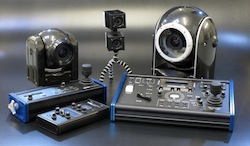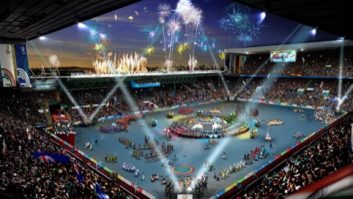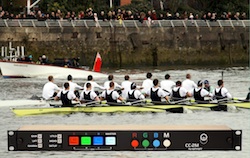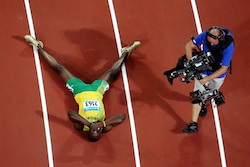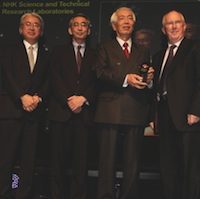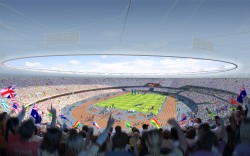
Richard Dean looks at the current state of play in frequency regulation and broadcast spectrum demand, during what is clearly set to be one of the most bandwidth-hungry events in history.
When London’s bid for the Olympic Games and Paralympic Games in 2012 crossed the International Olympics Committee’s (IOC) finishing line on 6 July 2005, the mood within the UK contingent was ecstatic. London had beaten Paris, widely considered to be front-runner, by 54 to 50 votes in the fourth and final round of the IOC’s two-year search for a host nation in seven years’ time.
Team UK delegates yelped and jumped for joy and partied late into the night at the dramatic announcement in Singapore, with many no doubt nursing a sore head in the morning. But arguably the biggest headache was reserved for frequency regulator Ofcom. Not only had the government-backed London 2012 bid given a cast-iron guarantee that the spectrum requirements of the entire ‘Olympic Family’ – organisers, athletes, broadcasters and sponsors – would be met in full, but that none of it would cost any of them a penny.
This last concession removes the facility to moderate demand with a pricing mechanism, but Ofcom is confident that professional etiquette will prevail. “The London Organising Committee for the Olympic Games (LOCOG) and Ofcom are working with the spectrum users to ensure that the spectrum is deployed as efficiently as possible,” says Peter Bury, London 2012 Spectrum Policy director at Ofcom. “This will be in everyone’s interest, given the exceptionally high level of demand from programme makers and others.”
The huge demand for London 2012 spectrum is driven by a heady cocktail of massive global media interest, a spectacular growth in the use of wireless technology including bandwidth-guzzling 20MHz HD links, and the sheer scale of an event covering multiple locations where in many cases signal traffic levels are already high.
For example, the last time London hosted a Grand Prix, the broadcast media used up to 44 wireless cameras, but during the Olympics this could rise to more than 75. Similarly while peak demand for wireless microphones at Glastonbury reaches 85, Ofcom is planning for 400 at the Games – plus a range of other uses including Wi-Fi hotspots for visitors and in-ear monitors (IEM) for event participants. Some 20,000 members of the world’s media are expected to attend the games.
Recognising that normal PMSE (Programme Making & Special Event) spectrum could not possibly handle the requirement, Ofcom has left no stone unturned in its quest to find every last drop of spectrum that could be begged, borrowed or bought to fill the gap.
The Ministry of Defence (MoD), the Civil Aviation Authority (CAA) and the Maritime and Coastguard Agency (MCA) have since agreed that, subject to certain constraints, wireless cameras will be able to use 2700-3100MHz and 3400-3600MHz. Details of these constraints are in Ofcom’s Spectrum Plan statement (see link in contact panel).
Meanwhile LOCOG, the BBC, host broadcaster Olympic Broadcasting Services (OBS) and others have lobbied hard for access to 2500-2690MHz (‘the 2.6 GHz band’) for wireless cameras, especially for airborne coverage as this is difficult to achieve with alternative bands.
However, fears emerged over whether airborne cameras operating at 2.6GHz might have an adverse effect on radars operating in the 2700–2900MHz band – or in plain English, the certainty with which Air Traffic Control (ATC) could keep planes safely in the sky.
Following an assessment, Ofcom stated in December 2010 that no interference from 2.6GHz airborne wireless cameras to ATC radars has been reported, the main reasons given as low camera signal power levels, the small numbers in use, and the ‘mobile and transient nature of this application’. In other words even if it happens, it will be too brief to do any harm.
The upshot is that the entire 2.6GHz band will be added to the London 2012 spectrum pot, albeit with strict limits on signal power for airborne applications, between 28 June and 23 September – one month before the Olympic Games opening ceremony to two weeks after the Paralympic Games closing ceremony.
Temporary access to 1.98GHz-2.01GHz and 2.17-2.2GHz bands normally used for mobile satellite services is also on the table. Currently not used for programme making, Ofcom believes these would be well suited to wireless camera use.
“This remains a possibility, but the exact availability is not yet certain,” says Bury. “Ofcom is continuing discussions with the operators of services in these bands and the licensees in adjacent bands, to determine the degree to which they could be shared with Games users.”
Allocating spectrum
A proposal to borrow parts of the licence-exempt 863MHz-865MHz band (Channel 70) for London 2012 wireless microphones and IEM sparked fears of cross-interference with up to 1,500 wireless microphones on the London Underground, while the British Entertainment Industry Radio Group (BEIRG) expressed similar concerns about equipment used for live performance. Ofcom took Channel 70 out of the plan.
Instead, spectrum released by Digital Switch Over (DSO) and the 800MHz band (790-862 MHz) reserved for pan-European mobile broadband will be made available for London 2012 wireless mics and IEM.
Will this delay the much-vaunted economic benefits of new ‘4G’ services such as Long Term Evolution (LTE) and WiMAX, originally planned to begin tests after the completion of DSO? “The 800MHz band will be awarded to new users as part of the Combined Award of spectrum alongside 2.6 GHz,” says Bury, “and Ofcom’s latest estimate of the timing of this award is in the last quarter of 2012.
“Remember that the 800MHz and 2.6GHz spectrum bands will not be available for new use until 2013 in any case – and will likely not be available in all areas of the UK until later in 2013 – so this step is unlikely to have a material impact on the timeline for the availability of new services to consumers.”
Bury adds that it may be possible to grant licences for non-operational trials and tests of new mobile or broadband data services in the 2.6GHz band during London 2012 providing these are carefully co-ordinated, with Olympics needs taking priority – although this is unlikely to be feasible within the M25, or indeed any location where wireless camera demand is expected to be high.
LTE services are known to interfere significantly with ATC radar, so full deployment will not be possible until a publically-funded ‘radar remediation’ project has been undertaken when London 2012 is over.
Still smarting from its members’ enforced eviction from channel 69 to channel 38 for mics and IEM, the BEIRG fears that future 800MHz band users will also cause interference to PMSE users. They are not alone, as in November 2011 the UK Parliamentary Culture, Media and Sport Committee urged Ofcom to include a provision enabling any significant interference to adjacent users to be considered grounds for that licence to be revoked.
Indeed, Ofcom received such a vociferous response to its original March to May 2011 consultation on these bands that it plans to consult again with refined plans around the end of this year, with a final decision statement due in summer 2012.
“We expect to publish a final version of the spectrum plan for the London 2012 Games early in 2012,” says Bury. Perish the thought, but what happens if despite all the detailed frequency planning, broadcasters find somebody else sitting on their spectrum? “If interference does occur, a network of monitoring stations in and around the venues will pick up and locate the source quickly,” says Bury. “Ofcom field staff will then be able to take rapid action to stop it.”
London Olympic contacts
Ofcom’s Spectrum Plan for the London 2012 Games is at http://stakeholders.ofcom.org.uk/spectrum/olympics/
Accredited Olympic Rights Holders:
+ Spectrum licences from The London Organising Committee for the Olympic Games (LOCOG), email spectrum (a) london2012.com or fax +44 (0) 203 2012 001
Non Accredited, Non Rights Holder Broadcasters (NRHB):
+ Spectrum licences from admin (a) jfmg.co.uk (the Arqiva subsidiary band manager for Ofcom)
+ Registration for the London Media Centre close to Horse Guards Parade where the Beach Volleyball competition takes place is at www.londonandpartners.com. The LMC offers rentable office space, edit suites, play-out facilities and stand-up positions connected back to a master control room within the venue, plus fibered positions near the Tower of London, on the South Bank and at Trafalgar Square.
Non-Olympic (‘business as usual’) users:
+ Spectrum licences from admin (a) jfmg.co.uk as normal
